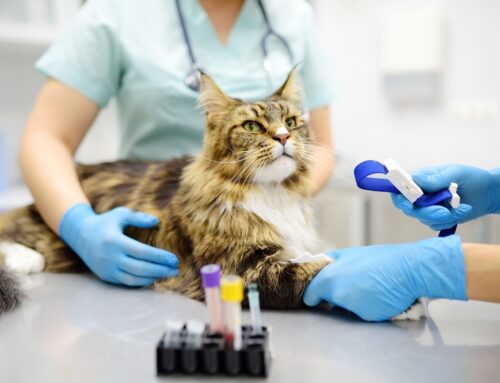You do everything you can to keep your beloved pet happy and healthy, and if you could, you would eliminate any risk of danger in their environment. While you can’t protect your pet by wrapping them in bubble wrap—well you could, but that would be weird—you can reduce their risk of fleas and ticks with year-round flea and tick preventives. Our Oliver Animal Hospital Team shares all the ins and outs of flea and tick prevention, so you can keep your pet safe.
What are fleas and how can my pet get them?
Fleas are tiny insects—we’re talking really tiny. Eight adult fleas lined up end to end would measure about one inch long. Their size means these little guys can hide out, undetected, in all sorts of places inside and outside your home—yikes! Additional flea characteristics include:
- Reddish-brown color
- Flat bodies
- Incredible jumping ability—fleas can easily jump onto your unsuspecting pet from ground level
- Feeding on blood, and excreting partially digested blood (i.e., flea dirt), which becomes food for flea larvae
Your pet can come into contact with fleas in a variety of ways, including:
- Other animals — While your pet is busy socializing with their furry friends, fleas can jump from one pup to another.
- Your home —Fleas can enter your home by hitching a ride on your clothing, your pet’s coat, or nesting animals, like mice, that may be living in your home.
- Outdoors — Flea larvae can be found in many warm, sheltered areas, such as barns or animal dens.
Why is year-round flea prevention important for my pet?
Fleas can cause your pet a great deal of discomfort, and can pose serious threats to their health, including:
- Flea allergy dermatitis (FAD) — The most common allergy affecting pets is a flea bite allergy, which can cause your pet extreme itchiness. FAD can also cause hair loss and skin lesions.
- Anemia — Puppies, kittens, and elderly cats are most at risk of developing anemia as a result of a flea infestation. If left untreated, anemia can lead to organ failure and brain damage.
- Tapeworm infection — If your pet ingests a flea that contains tapeworm larvae, the larvae can grow inside your pet’s intestines, and your pet will pass small, broken segments in their feces, irritating their anus—which sounds gross, but is no fun for your pet. Your pet will need a prescription deworming medication to treat the tapeworms.
What are ticks and how can my pets get them?
Ticks are related to spiders, so they have eight legs. Like fleas, ticks are extremely small—about the size of an apple seed—unless they have recently fed. Ticks are also hard to spot, and can easily hop on your pet. Other tick characteristics include:
- Flat, oval bodies that swell when they eat
- Feeding on the blood of all kinds of animals
- Second only to mosquitoes in spreading diseases, such as Lyme disease and Rocky Mountain spotted fever, to humans
Ticks often live in wooded areas with lots of shrubs, tall grasses, and weeds, and can attach to your pet during walks, hikes, or other outdoor activities, including in your backyard.
Why is year-round tick prevention important for my pet?
Ticks attach to your pet by inserting their mouthparts into their skin, and then remaining attached to their host through a sticky substance they produce. Once attached, ticks begin feeding on your pet’s blood, causing redness and irritation at the wound site. Ticks can cause many diseases in pets, including.
- Lyme disease — Lyme disease can cause arthritis and joint swelling in your pet. Lyme disease diagnosis is through blood testing, and treatment involves antibiotic therapy for at least 30 days.
- Rocky Mountain spotted fever — This can cause hemorrhages in your pet’s eyes and gums, as well as nosebleeds. Your infected pet may also suffer from neurological issues, such as ataxia (i.e., incoordination when walking) and joint pain.
- Tick paralysis — Tick saliva contains a neurotoxin that can attack the nervous system and cause progressive paralysis in pets. The pet can recover after the tick is removed, but the condition can be deadly if the tick is not found in time.
How can I protect my pet from fleas and ticks?

You can take measures to steer clear of fleas and ticks, but year-round prevention is essential. Many preventives not only protect your pet from fleas and ticks, but also heartworms and intestinal parasites. Ask your veterinarian about your flea and tick preventive options, as well as proper dosing for your pet.
If you need more information on flea and tick prevention, or would like recommendations on the best flea and tick preventives for your pet, contact Oliver Animal Hospital to schedule an appointment.







Leave A Comment